| Srl | Item |
| 1 |
ID:
163101
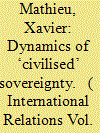

|
|
|
|
|
| Summary/Abstract |
Critical and post-colonial scholars have argued that a more complete account of sovereignty necessitates an exploration of the colonial experiences through which Western civilised identity was forged. But the way these ‘distant’ encounters were used in (and interacted with) the process of claiming sovereignty domestically has received less attention. This is surprising as critical scholars have revealed the existence of strong similarities between the domestic and international constructions of sovereignty (and in particular the necessary performance of a savage Other) and have emphasised how sovereignty transcends the domestic/international frontier and provides a crucial link between the two. As a response, this article develops an analysis of the construction of sovereignty that combines both the domestic and international colonial frontiers on which ‘civilised’ sovereignty relies. I use a large set of primary archives about France in the sixteenth century in order to explore how sovereignty depends on unstable colonial frontiers, that is, differentiations between the civilised and the savage, that are constantly contested and re-established. Combining the domestic and international colonial frontiers reveals how they interact and are used in order to reinforce the civilised identity of the Western ruler.
|
|
|
|
|
|
|
|
|
|
|
|
|
|
|
|
| 2 |
ID:
163102


|
|
|
|
|
| Summary/Abstract |
The debate on waterboarding and the wider debate on torture remains fiercely contested. President Trump and large sections of the US public continue to support the use of waterboarding and other so-called ‘enhanced interrogation techniques’ as part of the ‘War on Terror’, thus putting the anti-torture norm under pressure. This article demonstrates that the re-imagining of waterboarding as ‘torture-lite’ is contradicted by the long history of waterboarding itself. Examining pre-modern uses and descriptions of torture and waterboarding, this article highlights that the post-2001 identification of waterboarding as a relatively benign interrogation technique radically inverts a norm that has predominated for over 600 years. This historical norm unequivocally identifies waterboarding not only as torture but as severe torture. The article highlights the value of historically contextualizing attitudes to torture, reviews how and why waterboarding was downgraded by the Bush Administration, reveals the earliest explicit description of waterboarding from 1384, and argues that the twenty-first-century re-imagining of waterboarding as torture-lite is indicative of the fragility of the anti-torture norm.
|
|
|
|
|
|
|
|
|
|
|
|
|
|
|
|
| 3 |
ID:
163097
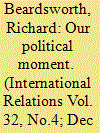

|
|
|
|
|
| Summary/Abstract |
National interest and national security need to be reconfigured so as to accommodate a state’s response to global threats and challenges. This requires in turn addressing the following paradox: the pooling and ceding of sovereignty must be made in the very name of national sovereignty. The article maintains that it is one of the foremost challenges of political responsibility and political leadership today to assume this paradox and thereby align national and global interests and practices. The alignment can, it is suggested, effectively oppose sovereigntism and nationalism, on one hand, and abstract global governance, on the other. To promote this alignment, the article advances a renewed understanding of state responsibility to citizenship under conditions of globalization.
|
|
|
|
|
|
|
|
|
|
|
|
|
|
|
|
| 4 |
ID:
163099
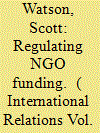

|
|
|
|
|
| Summary/Abstract |
Securitization theory (ST) has succeeded in putting the relation between politics and security at the forefront of research in security studies. Despite this success, little attention has been given to the way states themselves produce the boundaries of legitimate political activity, particularly in relation to the boundaries between civil society and the state and between the foreign and domestic. This article is concerned with how states see the boundary between the political and the non-political as a matter of security. It investigates this question by examining the international and national efforts to restrict the financing of non-governmental organizations (NGOs) and civil society actors. It demonstrates that these entities are deemed threatening to the established boundaries of legitimate political activity and thus subject to harassment, increased regulation, and eradication. This is done by the depiction of their activities as political, rather than humanitarian/cultural/social, demonstrating that the concepts of politics operative in the ST literature are already delimited through processes of securitization and depoliticization. Continued research into the relation between politics and security must therefore consider the ways that the political itself is securitized.
|
|
|
|
|
|
|
|
|
|
|
|
|
|
|
|
| 5 |
ID:
163100
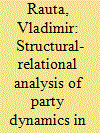

|
|
|
|
|
| Summary/Abstract |
Proxy wars are still under-represented in conflict research and a key cause for this is the lack of conceptual and terminological care. This article seeks to demonstrate that minimising terminological diffusion increases overall analytical stability by maximising conceptual rigour. The argument opens with a discussion on the terminological ambivalence resulting from the haphazard employment of labels referencing the parties involved in proxy wars. Here, the article introduces an analytical framework with a two-fold aim: to reduce label heterogeneity, and to argue in favour of understanding proxy war dynamics as overlapping dyads between a Beneficiary, a Proxy, and a Target. This is then applied to the issues of defining and theorising party dynamics in proxy wars. It does so by providing a structural-relational analysis of the interactions between the above-mentioned parties based on strategic interaction. It presents a tentative explanation of the proxy relationship by correlating the Beneficiary’s goal towards the Target with the Proxy’s preference for the Beneficiary. In adding the goal-preference relational heuristic, the article advances the recent focus on strategic interaction with a novel variant to explanations based on interest, power, cost–benefit considerations or ideology.
|
|
|
|
|
|
|
|
|
|
|
|
|
|
|
|
| 6 |
ID:
163098
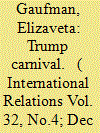

|
|
|
|
|
| Summary/Abstract |
This article argues that a Russian analytical paradigm of carnival culture can help explain the successful presidential campaign of President Donald J. Trump. Russian philosopher and literary critic Mikhail Bakhtin developed the notion of carnival culture while analyzing Francois Rabelais’ work and its connection to the popular culture of Renaissance. Carnival ethos stood in opposition to the ‘official’ and ‘serious’ church sanctioned and feudal culture, by bringing out folklore and different forms of folk laughter that Bakhtin denoted as carnival. Carnival culture with its opposition to the official buttoned-up discourse is supposed to be polar opposite, distinguished by anti-ideology and anti-authority, in other words, anti-establishment – the foundation of Trump’s appeal to his voters. This article examines the core characteristics of carnival culture that defined Trump’s presidential campaign from the start.
|
|
|
|
|
|
|
|
|
|
|
|
|
|
|
|